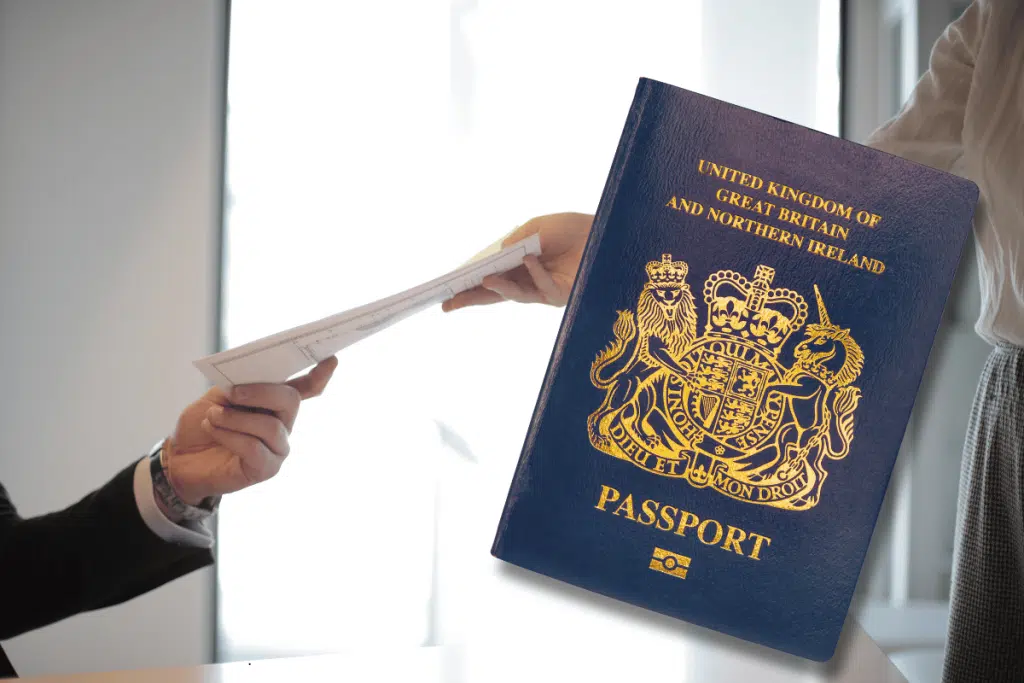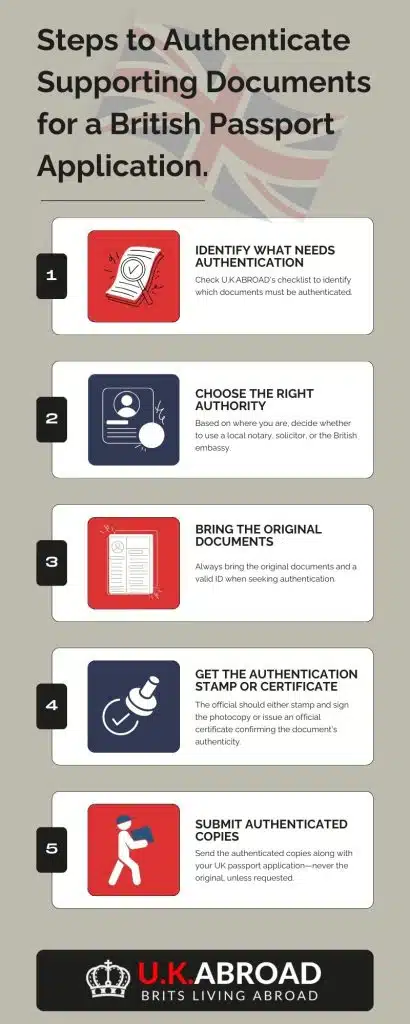Last Updated on June 6, 2025 by Tracey Roberts
Reviewed by Brittany Romain, Senior UK Passport Specialist (2025)
Topic | How to Authenticate Supporting Documents for UK Passport Applications Abroad?
Applying for a UK passport from abroad can be a smooth process – if your supporting documents are in order.
One key step in the application process is ensuring your documents are properly authenticated. Whether you’re renewing a passport or applying for one for the first time, understanding this step is essential to avoid delays or rejections.
In this guide, we explain what document authentication is, why it matters, and how to get it done right, no matter where you are in the world.

Main Points
- Authentication confirms that your documents are real and trustworthy.
- Use a notary, lawyer, or British embassy to authenticate your documents while abroad.
- Only specific documents need to be authenticated – check the requirements before applying.
- Mistakes or missing authentication can lead to serious delays.
- Always keep personal copies and plan ahead to avoid stress.
What Does “Authenticate” Mean?
Authentication is the process of confirming that a document is genuine. For UK passport applications, this often applies to original or certified copies of documents such as:
- Birth or marriage certificates
- Naturalisation certificates
- Legal name change documents
- Parental consent forms (for child applications)
- Proof of address or residence
HM Passport Office (HMPO) needs assurance that your documents are legitimate. This is where authentication comes in.
Why Is Document Authentication Important?
UK authorities cannot always verify foreign-issued documents or documents submitted from abroad without some form of official confirmation. This step helps prevent fraud and ensures that every passport is issued based on valid evidence.
Failure to authenticate documents properly can result in:
- Application delays
- Requests for resubmission
- Rejection of the passport application
- Loss of application fees in some cases
Statistics: 43948 British passport applications from overseas required additional information before processing in 2024.
Source: gov.uk
Who Can Authenticate Documents Abroad?
If you’re applying from overseas, there are several options for getting your documents authenticated:
1. Notary Public
A notary public is a legal professional who can certify documents and confirm the identity of the person signing them. Notarisation is widely accepted by HM Passport Office.
2. Solicitor or Lawyer
Some countries allow solicitors or licensed lawyers to provide official certifications.
3. British Embassy or Consulate
In many cases, British consular services can authenticate documents. They can confirm copies of original documents or provide a consular certificate of authentication. Fees apply, and an appointment is often required.
4. Local Authorities or Government Offices
In some countries, certain civil registry offices can issue authenticated copies of local documents (e.g., birth certificates) that are accepted by the UK authorities.
Steps to Authenticate Supporting Documents
Here’s a general process you can follow to get your documents authenticated abroad:
Step 1: Identify What Needs Authentication
Check U.K.ABROAD’s checklist to identify which documents must be authenticated.
Step 2: Choose the Right Authority
Based on where you are, decide whether to use a local notary, solicitor, or the British embassy.
Step 3: Bring the Original Documents
Always bring the original documents and a valid ID when seeking authentication.
Step 4: Get the Authentication Stamp or Certificate
The official should either stamp and sign the photocopy or issue an official certificate confirming the document’s authenticity.
Step 5: Submit Authenticated Copies
Send the authenticated copies along with your UK passport application—never the original, unless requested.
Read | How to find my UK passport number
Tips for a Smooth Process
- Plan ahead: Authentication can take time, especially if embassy appointments are required.
- Check fees: Embassies and notaries may charge a fee for authentication services.
- Use a trusted service: Always choose registered legal professionals or official consular offices.
- Keep copies: Before submitting, make additional copies for your own records.

FAQs
Do I need to authenticate all supporting documents?
Not always. Only specific documents, particularly those issued outside the UK or those that are photocopies, may need authentication. Always check with your advisor or the official HMPO guidance.
Can I send original documents instead of authenticated copies?
In some cases, yes—but this is discouraged as originals may not be returned. It’s safer to send authenticated copies.
Will HMPO accept documents notarised in a non-English language?
They may require a certified English translation in addition to the original or authenticated document.
Is legalisation the same as authentication?
No. Legalisation is a separate process often involving an apostille (used for international legal documents). For passport applications, standard authentication is usually sufficient.
Can I use a UK-based solicitor while I’m abroad?
This may be possible if you courier your documents, but it’s typically more practical to use a local authority or embassy.
Need Help with Your Passport Application?
At U.K.ABROAD, we help British citizens living overseas through every step of the UK passport process. Whether it’s guidance on authentication or document submission, our experienced consultants are here to help.
“The customer service I recently received from my consultant Colin at U.K. ABROAD far exceeded my expectations. I was expecting a lengthy stressful process to renew my expired British passport. Instead, I experienced, efficient, timely and hassle-free service.”
Get started today by visiting www.ukabroad.net or contacting our team for personalised support.
Topic: How to Authenticate Supporting Documents for UK Passport Applications Abroad?
Read | Do you have to send your old UK passport back when renewing online?

